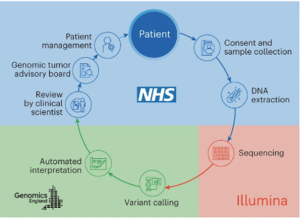In the landscape of cancer care, hopeful initiatives like the 100,000 Genomes Project are reshaping the way we understand and treat brain tumours. As an advocate for the brain cancer community, brainstrust is at the forefront of supporting studies like these through its PRIME (The Patient Research Involvement Movement) service. In this article, we delve into the transformative power of Whole Genome Sequencing (WGS) and its implications for individuals living with brain tumours.
Understanding Whole Genome Sequencing 
Whole Genome Sequencing (WGS) is a technique that enables the comprehensive reading of a person’s entire genome, comprising the 3.2 billion letters that make up our DNA. For those facing the challenges of brain cancer, WGS holds the promise of a more precise and personalised approach to diagnosis and treatment.
In the world of brain cancer research, the 100,000 Genomes Project is emerging – an ambitious initiative that aimed to provide WGS for people living with cancer. With Genomics England and NHS England leading the charge, the project has analysed WGS data from 13,880 solid tumours across 33 cancer types. This pioneering effort laid the foundation for integrating WGS into routine cancer care, ushering in an era of precision cancer care.
What does this mean for the patient?
Patients participating in the project provided informed consent for WGS analysis. The DNA extracted from tumour and normal (blood) samples underwent rigorous WGS analysis. The results were then reviewed in regional Genomic Tumour Advisory Boards (GTABs), contributing to a collaborative and comprehensive approach.
By combining genomic data with routine clinical information, researchers have identified specific genetic changes associated with survival rates and improved patient outcomes. This precision cancer care approach, now integrated into the NHS Genomic Medicine Service, has the potential to revolutionise cancer management globally.
In the realm of brain tumours, the 100,000 Genomes Project has provided an analysis of the genomic landscape of glioblastoma and low-grade brain tumours. The study involved WGS analysis on 491 individuals, revealing that over 90% of brain tumours exhibited genetic changes influencing treatment decisions. This knowledge guides choices about surgery and specific treatments, offering hope for improved outcomes.
Moving forward
The NHS Genomic Medicine Service, launched in 2018, is speeding up the process of capturing WGS for individuals living with brain tumours. Additionally, the Cancer 2.0 initiative by Genomics England is creating a multimodal cancer research platform. This platform integrates imaging data from x-ray, MRI, and CT scans with existing clinical and WGS data, providing a holistic understanding of cancer and its response to treatments.
The integration of Whole Genome Sequencing into cancer care, exemplified by the 100,000 Genomes Project, marks a paradigm shift in the understanding and treatment of brain tumours. Through initiatives like PRIME, brainstrust ensures that the brain cancer community remains informed, engaged, and empowered. As the journey of genomic discovery continues, there is renewed hope for more effective, personalised, and targeted interventions that will positively impact the lives of those living with brain tumours.
Want to receive all the latest research straight to your inbox?
Sign-up our curated, jargon-free weekly research newsletter. Click here to fill out our contact form and select ‘research’ to opt into our research newsletter.
Get involved with research…
If you would like to use your experience and insight to support clinical research, consider signing up to be a PRIME advocate for brainstrust.
If you or someone you love is living with a brain tumour and have any questions around this latest news, or want to access support, give us a call on 01983 292 405 or email hello@brainstrust.org.uk. You can also visit our little brainstrust website which features support for children affected by brain tumour.









